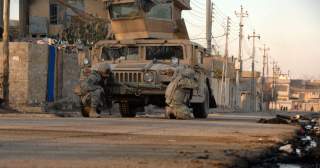Will the COINdinistas Rise Again?
Purging the counterinsurgency lessons of the Iraq War for fear of striking a political nerve would be a mistake—and H. R. McMaster knows better.
The president’s bomb-only approach belies echoes of Sisyphus. Trump may inadvertently sentence America to a lifetime of boulder pushing. Higher and higher the military rolls the insurgent boulder up the hill. Just when the summit is in sight, the boulder falls to the bottom. And so on, for eternity.
A few glimmers of hope, however, may be squeezing through the cracks. Weeks into his presidency, Trump replaced his ethically challenged national security advisor, Michael J. Flynn, with a man once responsible for rooting out corruption in Afghanistan. McMaster now appears to be wresting control of the National Security Council from the White House’s toxic ideologues. Steve Bannon’s permanent seat on the Principals Committee has been revoked, while the director of national intelligence and the chairman of the joint chiefs have had theirs restored. McMaster has relocated Flynn’s deputy, K. T. McFarland, to Singapore. He’s poached Dina Powell, one of the few Trump aides with government experience. Most encouraging, he’s hired a scholar named Nadia Schadlow. Both John Nagl and Peter Mansoor sang her praises, independently and unprompted. Schadlow’s new study hit the bookshelves right around the time Trump was releasing his draconian budget blueprint. The subtitle of War and the Art of Governance is alone cause for cautious optimism: “Consolidating Combat Success into Political Victory.”
It would be a mistake of epic proportions to purge counterinsurgency’s underlying principles for fear of conjuring images of failed nation building. Yes, a full-blown counterinsurgency do-over is as unviable as it is imprudent. But throwing out the baby with the bathwater would be folly. USIP is but one example of diplomatic effort complementing military sacrifice. Good policy need not be bad politics. At bare minimum, Trump has an obligation to uphold his campaign promises to protect core U.S. interests in Iraq, which he has, more or less, reduced to “ISIS bad. Iran bad.” Emboldening moderates in Iraq is consistent with one of the president’s favorite talking points—hedging against Iranian subterfuge. Like ISIS, Iran feeds on sectarian strife and political dysfunction. Michael Singh, the former NSC official, made an emphatic point of this. “An unstable, conflict-ridden Iraq,” Singh told me, “will inevitably be a vector for Iranian power projection, just as Syria, Lebanon and Yemen have been.”
If he had the incentive, Trump could advance a deft Iraq policy without violating the nebulous tenets of “America First.” He could don a veneer of pragmatic national-security ethos and proclaim, with something approximating conviction, that ISIS will never again be allowed safe haven. If he were to revise his “skinny budget,” he’d have at his disposal a blend of military and nonmilitary assets uniquely equipped to render Iraq inhospitable to the insurgents who have cast such an indelible shadow over the American homeland. By funding that recipe’s civilian ingredients and disabusing himself of a “bomb the shit out of ’em” mentality, the president could secure lasting bang for a shoestring buck. In other words, H. R. McMaster must teach Donald Trump how to eat soup with a knife.
Zach Abels is an assistant managing editor at the National Interest.
Image: U.S. Army soldiers in Mosul, Iraq. Flickr/U.S. Army
Note: This article has been updated since its original posting.

